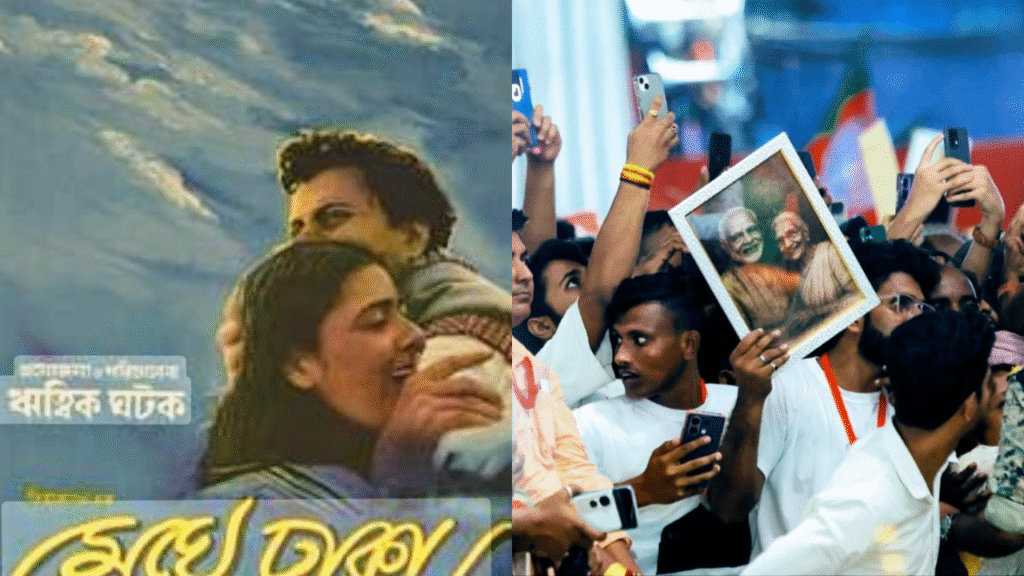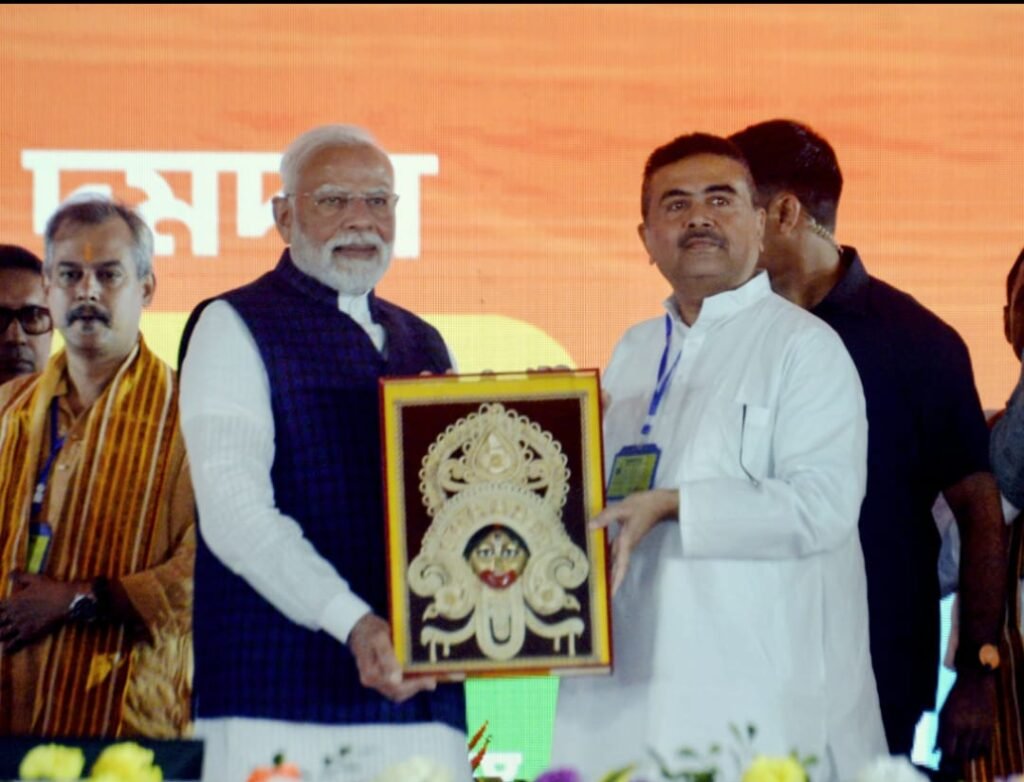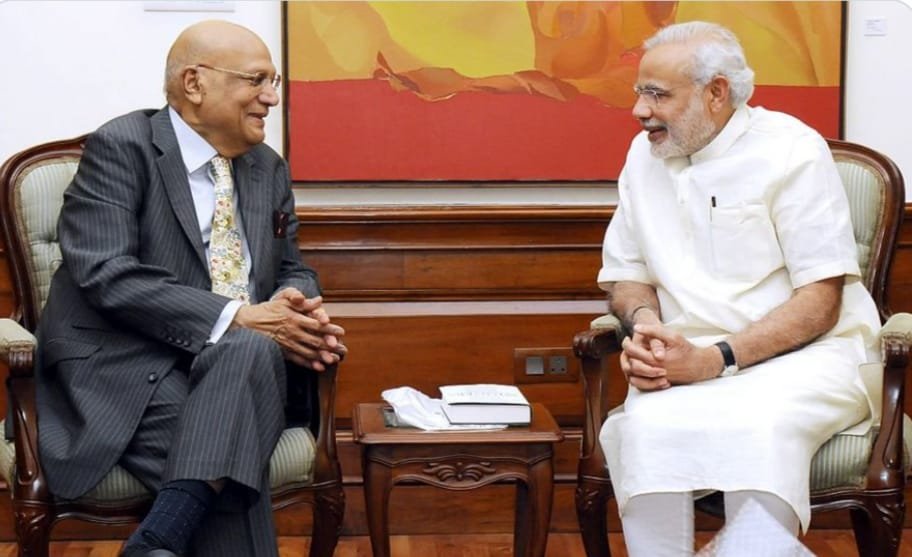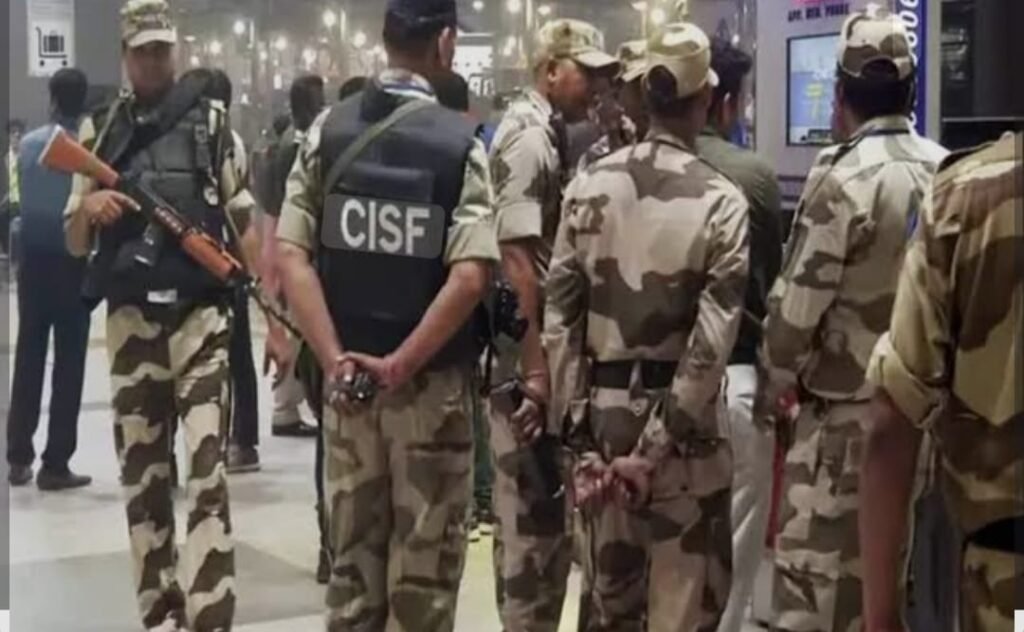Modi Borrows Ritwik Ghatak’s Iconic Cry “Dada Ami Bachte Chai” to Frame Bengal Political Battle

Prime Minister Narendra Modi on Friday invoked one of the most iconic lines in Indian cinema – Ritwik Ghatak’s ‘dada ami bachte chai” (Dada, I want to live) from Meghe Dhaka Tara – to frame his political narrative in West Bengal. The line, delivered by the tragic character Neeta in the 1960 classic, has long symbolized the pain and survival struggles of Partition refugees. Modi used the phrase in his speech to suggest that the Bharatiya Janata Party (BJP) represents the survival instinct of Bengal itself. “ami bachte chai BJP tai” (I want to live so I want BJP) he declared, echoing Neeta’s desperate cry, and linked it to the plight of those who fled East Pakistan, now Bangladesh, during Partition. Political commentators immediately noted the weight of the choice. Ghatak’s Meghe Dhaka Tara is not just a film but a social document of uprooted lives, particularly refugees who lost everything in the division of Bengal. Neeta, played by Supriya Devi, sacrifices herself for her family only to collapse under the unbearable weight of exploitation and despair. Her final cry, “Dada, I want to live!” spoken to her brother Shankar, continues to resonate across generations as a universal expression of human suffering and resistance. By placing himself in that emotional lineage, Modi signaled two things: his party’s identification with displaced Hindus who crossed into Bengal for survival, and his resolve to prevent a repeat of that displacement. In the same breath, however, he reaffirmed his hard line against what he termed “illegal infiltrators,” vowing to “drive them out of Bengal.” The BJP’s opponents accused Modi of emotional manipulation. West Bengal Pradesh Congress spokesperson Soumya Aich Roy said the prime minister was “stealing the emotional history of Bengalis to capture power in the state.” He argued that while BJP tries to appropriate Ghatak’s imagery for political gain, the party simultaneously fuels hostility against Bengalis in other parts of India. “Partition was not just a Hindu-Muslim divide; it was the trauma of millions,” Roy said. “To use Ghatak’s words in a campaign against so-called infiltrators is not only cynical, it is an insult to Bengal’s history.” For the BJP, however, cultural symbols are proving to be powerful tools in the run-up to the 2026 state elections. Party sources suggest that Modi’s reference is part of a wider attempt to anchor its campaign in Bengal’s collective memory of displacement, survival, and identity. The symbolism also arrives in a heated cultural moment. Filmmaker Vivek Agnihotri, known for The Kashmir Files, has announced his new film The Bengal Files, which he says will document Bengal’s political violence. Chief Minister Mamata Banerjee has signaled she may block its release in the state. Against that backdrop, Modi’s borrowing of Ghatak – one of Bengal’s most revered filmmakers, born in Rajshahi in undivided East Bengal – is being seen as a deliberate attempt to outmaneuver the Trinamool Congress by seizing the cultural high ground. “Ghatak’s cinema is the greatest testament to the wounds of Partition,” said one political analyst in Kolkata. “By invoking him, Modi is telling Bengal: we, the BJP, are the true inheritors of your pain, and the guardians of your survival.” For Bengal, however, the question remains: can a line that once captured the existential cry of refugees now be transformed into a political slogan? And will voters see it as empathy, or exploitation?
Modi Defends Controversial Constitutional Amendment Bill, Trinamool Hits Back

Kolkata, India – The political storm over the 130th Constitutional Amendment Bill intensified on Friday as Prime Minister Narendra Modi defended the legislation during a Bharatiya Janata Party (BJP) rally in West Bengal, drawing sharp rebuttals from the state’s ruling Trinamool Congress (TMC). Introduced in the Lok Sabha earlier this week despite fierce opposition, the bill has been branded by critics as a tool for the federal government to sideline elected state administrations. The TMC has led protests, warning that the amendment would allow New Delhi to bypass courts and dissolve opposition-ruled governments at will. Addressing BJP supporters at Dum Dum Central Jail grounds near Kolkata, Modi sought to justify the bill by invoking recent corruption scandals involving TMC ministers. Without naming them, he referred to the arrests of former state education minister Partha Chatterjee and food minister Jyotipriya Mallick, both jailed on graft charges. “Government employees lose their jobs if they spend more than 50 hours in jail. Why then should a chief minister, a minister, or even a prime minister continue to run a government from prison?” Modi asked, echoing remarks he made earlier in Bihar. “One minister was caught in the teachers’ recruitment scam, with piles of cash found in his house. Another looted rations meant for the poor. Yet both refused to resign, showing contempt for the people and the Constitution,” he said. The TMC fired back, accusing Modi of hypocrisy. “The prime minister is throwing stones from a glass house,” senior minister Shashi Panja said. “He points fingers at others while ignoring serious charges against his own party leaders.” Panja alleged that 94 of the BJP’s 240 MPs face criminal cases, including 63 involving serious charges. The TMC also accused the BJP of political opportunism, noting that corruption allegations against several leaders disappeared once they switched sides and joined the saffron camp. “The same leaders Modi once denounced are now his own,” Panja added. For the TMC, the amendment bill represents not reform but an assault on India’s federal structure. And as both parties exchange accusations of graft, the looming battle over corruption and power has become a key flashpoint ahead of the 2026 West Bengal elections.
Indian-born UK industrialist and philanthropist Swaraj Paul dies at 94

Indian-origin industrialist and philanthropist Lord Swaraj Paul, founder of the Caparo Group, has died at the age of 94 in London, his family said on Thursday. Paul, a member of Britain’s House of Lords, passed away in a London hospital where he had been admitted recently due to age-related illness. Born in Jalandhar, India, Paul moved to the UK in the 1960s, initially for his young daughter Ambika’s cancer treatment. After her death at the age of four, he settled in Britain and went on to build Caparo Group, a diversified engineering firm with operations across the UK, North America, India and the Middle East. His son Akash Paul became CEO of the group in 1992. Paul also set up the Ambika Paul Foundation, supporting children’s health and education, and later established other charitable ventures after the deaths of his son Angad in 2015 and wife Aruna in 2022. Tributes poured in from across the world, including Indian Prime Minister Narendra Modi, who called Paul’s passing a loss to industry and philanthropy. Fellow peer Lord Rami Ranger also expressed condolences. Despite living abroad for decades, Paul maintained close ties with India, enjoying warm relations with leaders from former Prime Minister Indira Gandhi to current West Bengal Chief Minister Mamata Banerjee. Paul was widely recognised for his philanthropy and contributions to UK-India relations.
India to Boost Industrial Security Force to 220,000 Personnel

India’s Ministry of Home Affairs has approved a significant expansion of the Central Industrial Security Force (CISF), raising its authorised strength from 162,000 to 220,000 personnel over the next five years. The move comes as the government seeks to bolster security for the country’s fast-growing economy, with new industrial hubs and critical infrastructure projects driving demand for enhanced protection. Around 14,000 new recruits will join the force annually, adding to the 13,230 personnel inducted in 2024. Recruitment for a further 24,098 is already under way this year. Officials say the expansion will strengthen CISF’s presence across sensitive sectors including airports, seaports, power plants, nuclear installations, hydroelectric projects and even prisons in Jammu and Kashmir. With left-wing extremism in decline in states such as Chhattisgarh, new industrial centres are expected to emerge, necessitating greater security coverage. The force is also seeking to increase the number of women in its ranks, with recruitment drives and internal policies encouraging higher female participation. The annual intake of younger personnel, the Home Ministry says, will make the CISF more “battle-ready” for internal security and emergency deployments. Over the past year, the CISF has taken charge of seven new units under its Security Wing, including the Parliament House complex, Ayodhya Airport, and several power projects across India. Two additional units have been inducted under its Fire Wing, including one at Parliament House. The government says the expansion underscores its commitment to ensuring the CISF remains “a robust and responsive force” in line with India’s evolving security needs, as the country continues to accelerate its economic and infrastructure growth.






